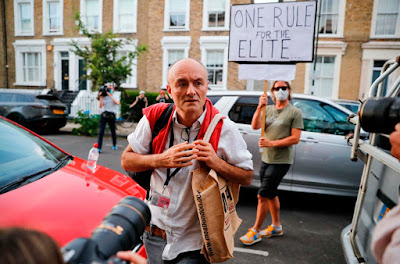Dominic Cummings broke the rules, broke the law, lied about it and remains the most powerful unelected man in the UK. Public opinion is certainly against Cummings and has turned against Boris Johnson for supporting him. This could have been a pivotal moment politically if only we had an opposition capable of taking advantage. On the other hand, it remains true that opposition parties don't win elections, ruling parties lose them.
As I have previously outlined in some detail Tony Blair's New Labour did not win by attracting Conservative voters but because Conservatives abstained. Widespread disillusionment with the Tories could have the same effect again.
The polls certainly do not make good reading at the moment if you are a Tory strategist. In a JPL poll published in the Daily Mail, 66% (and crucially 52% of Tory voters) thought Cummings had lied. 59% (and 51% of Tories) thought Cummings was "arrogant.
A lying, arrogant Tory. Well, who would have expected such a thing. Except, strictly speaking Dominic Cummings is not a Tory. At least he is not a member of the Conservative Party. Neither is he a Civil Servant, so not bound by their code of conduct. Nor is he a journalist, though he is married to Spectator writer Mary Wakefield. I'm not going to write a biography of Cummings, because I feel that there is a far more serious issue at stake here.
It will come as no revelation that I am not a big fan of the Conservative Party. Like many I do not believe that December's General Election was fought fairly. The fact that Labour insiders were working for a Labour defeat, the suspicion that the postal vote was subject to fraud, and a media campaign against Labour's leader that was personalised to the extent of paranoia all point to a strong possibility that Labour were denied a victory mainly for being too left-wing for the Establishment to stomach.
For all that, the Conservatives were elected. Maybe not fairly nor squarely, but however they managed it, they managed to win enough seats to make it appear that Labour were crushed. They are, therefore, "representatives" of constituencies and answerable to their constituents. Our democracy is far from perfect, but in a strange way it has, until recently, appeared to be, on the whole, legitimate.
Yes, it is far from proportional. Yes, it allows for party favourites to be parachuted into "safe" seats. Yes, it seems increasingly remote from the lives of ordinary people. But, until recently, it was defensible as a system that seemed, on the face of it, to give outcomes that were, broadly, in line with what the country (by which I mean the UK, not Scotland, Wales or Northern Ireland) wanted.
What I have just written will enrage many on the left, and if they read it, many on the right too. But, an imperfect democracy is better than no democracy at all. And, any democratic system is open to manipulation meaning that it cannot be judged solely on its results. That is not to say that I am either happy with the results or that I don't think the system can be improved.
But something else is happening. Democracy itself is being undermined. And, the Dominic Cummings affair has brought to the surface that which had previously remained hidden. A non-elected so-called "Special Advisor" (or SPAD as I believe they are called) breaks the law, is caught out and is so powerful that almost the entire Cabinet rally immediately to defend the indefensible. Let's just recall that Cummings was the "mastermind" behind the Vote Leave campaign which was caught breaking the spending rules and told some of the most outrageous lies of the Referendum campaign. Cummings was the advisor whose advice included proroguing Parliament, ignoring the Supreme Court and lying to The Queen. Cummings, we are led to believe, was a member of SAGE which against all the available evidence refused to put the UK in to lockdown until the Covid virus was rampant throughout the population. Cummings was also the man who enraged an usually compliant press corps by separating those considered loyal to the Government. In short, Cummings has been the most powerful man in the UK since Johnson became leader of the Conservative Party and Prime Minister. He is also prone to creating chaos. As Jill Rutter of the Institute of Government says Cummings, and through him Johnson has a “complete disregard for what we have come to regard as the norms of constitutional conventions.”
Cummings believes he is above the law. He believes he is incredibly important. And, a man who could not manage to concoct a credible story for public consumption, clearly believes he is incredibly clever. Of course, if you are surrounded by Hancock, Raab and Gove it is probably easy to think of yourself as a genius. I rather worry that the cleverest person in the room at Cabinet meetings is quite likely the pot plant in the corner.
What is most worrying about our current government is not that they are incompetent (though 40,000 deaths and rising is pretty damning), it is not even that they are corrupt (though funneling public funds to private organisations in which they have a stake isn't a good look), but their fondness for avoiding accountability. Their instinct, when questioned, is simply to lie. Indeed, so ubiquitous are Ministers lies that mostly we just shrug and move on.
Public trust in politicians has never been lower and although some on the left will celebrate this as a sign that people are seeing through the system, recent electoral results suggest that they are not turning leftward.. When we lose faith in politicians it induces cynicism rather than radicalism. We are moving back rapidly to the Blair days where people started to believe there was no difference between the parties. At least Jeremy Corbyn gave people a choice at the ballot box, but the lack of a dear opposition means that Labour is not challenging the drift to authoritarianism and rule by backroom SPAD's with no democratic mandate and no stake in democratic institutions.
The British PM, unlike the US President, has never been chosen by public vote. But, they have needed to be elected at the ballot box. The drift toward the primacy of what the economist JK Galbraith described as "technocrats" begun under Blair when Cabinet Ministers no longer needed to be elected MPs but to have a "talent" that was seen as lacking in elected representatives. This might be business-related or scientific, usually it was/is just being loyal to the PM and his “project”. That said, it is interesting that as the New York Times describe it, Johnson “has little fixed ideology and is capable of shifting positions for political expediency.” In this, he is rather like Tony Blair who was famously dismissive of political ideology. But, whilst their public pronouncements give the impression that they are simply making it up as they go along, privately these individuals are subjected to the manipulation of their advisors.
As Jonathan Cook has noted the problem with the furore over Dominic Cummings (and, as a result Emily Maitlis) is that the issues have become personalised. Instead of concentrating on the damage that is being done to our institutions we fall back on the "one bad apple" approach whereby if one individual is eviscerated or exonerated life can return to normal. But normal, as Cook documents consistently in his blog, is to support the Establishment, not to oppose it. It is hard to argue with his conclusion on Maitlis:
“Like her colleagues, family and friends, Maitlis felt personally angry. She let that anger cloud her judgment. Her emotion trumped her normally astute journalistic instincts to avoid ruffling the feathers
of those who paved her career path to the top of the BBC. She made the mistake – for once – of doing real journalism when what is expected of her is charade-journalism.”
Right now, public anger (according to polls) is directed mainly at Cummings. Johnson and his incompetent bunch of Cabinet colleagues, are feeling that anger mainly because they are completely misunderstanding its depth. Even if Cummings were to resign (which looks increasingly unlikely) the hypocrisy at the heart of this could stick. But it probably won't.
Cummings has contempt for Tory MPs let alone the British public. In his Rose Garden Address one thing he said which went largely unnoticed revealed how he saw his position.
“It was obvious that the situation was extremely serious” he said referring to the pandemic crisis “I felt like I ought to return to work if possible, given I was now recovering, in order to relieve the intense strain at No. 10.” This, we should remember, was not a Cabinet Minister or even a scientist with specialist knowledge, but a hired political aide. Either he over-rates his own importance or as this statement makes clear he is central to Government decision-making: “I was involved in decisions affecting millions of people, and I thought that I should try to help as much as I could do.”
Dominic Cummings is clearly an abrasive character and has plenty of enemies (though not the scores he alleged were protesting outside his house) and he is on the extreme wing of Conservative ideology. But, if he were simply an advisor he would be sacked and another advisor found. But, he is not just an advisor that has become clear as Minister after Minister has prostrated themselves on national TV to retain his benevolence. If Johnson was Cummings choice as Conservative leader, then their political future is best served by retaining his support. And, “if a few pensioners die” along the way, as Cummings reportedly said, then so be it.
For those of us who believe in democracy, no matter how flawed, the gradual erosion of transparent decision-making and the ceding of power to unelected officials is deeply disturbing. At a time when it is pretty much impossible to take to the streets safely to protest we can only sign petitions and use social media to show our feelings. This may not yet be the death of democracy, but it lies fatally wounded.




No comments:
Post a Comment
Many thanks for reading this post and for commenting.